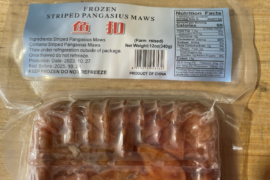The Tarpon Springs, Florida-headquartered Southern Shrimp Alliance (SSA) has filed a letter with the Office of the United States Trade Representative (USTR) requesting that the additional 25 percent duties imposed on Chinese goods, including seafood, be continued.
Originally imposed by President Donald J. Trump in 2018 under “Section 301” trade authority, the additional tariffs on imported goods from the PRC are legally required to undergo a review at the completion of a four-year period. Unless members of a domestic industry who benefit from the Section 301 action submit a written request to the USTR for continuation of the action, the additional duties are eliminated.
The deadline for submitting requests to the USTR for the continuation of the first round of additional tariffs imposed on Chinese products is July 5, 2022. As of June 30, the USTR had already received over 200 comments on its docket for requests to continue the Section 301 action. While the USTR has not made the comments received by the agency available to the public, according to the Southern Shrimp Alliance the sheer number of submissions demonstrates the importance of the Section 301 duties on Chinese imports to a wide spectrum of American industries.

For seafood, the SSA’s analysis of official US trade data indicates that the value of seafood from the PRC subject to the Section 301 tariffs has fallen from $2.8 billion in 2018 to $1.6 billion in 2021. Although Chinese seafood exports experienced a sharp decline with the imposition of additional duties, US importers quickly turned to other sources of supply to replace the loss, with Americans continuing to increase their consumption of these products. Overall, imports of this seafood from the rest of world rose by $6.8 billion in value between 2018 and 2021 – a 36 percent increase over the last four years.
For shrimp, imports of Chinese frozen, non-breaded shrimp have plummeted from $155.6 million in 2018 to just $1.4 million in 2021. Again, this decline has not limited American consumers’ access to shrimp, as the total value of frozen, non-breaded shrimp imports from all sources increased by nearly 29 percent over the same timeframe. While shrimp imports from China collapsed from 42.4 million pounds prior to the imposition of the Section 301 duties to 673,586 pounds last year, the total volume of all shrimp imported into the United States increased by 414.2 million pounds since the additional tariffs have been in place.
The sharp decline in Chinese seafood imports has not only helped US seafood producers who had been forced to compete with unfairly traded goods, according to the Southern Shrimp Alliance, but has also been a major boon to US consumers. As the SSA also catalogued in its comments, “the abuse of banned antibiotics in Chinese aquaculture continues to be rampant and has been extensively documented in academic study after academic study since the imposition of the Section 301 duties. These studies, in turn, are supported by the findings of the US Food and Drug Administration (FDA).”
Even with the large reduction in Chinese seafood exports to the United States since 2018, the PRC’s share of overall seafood import entry line refusals for reasons related to the presence of veterinary drug residues has increased to over 47 percent. As shown in the table below, China has accounted for 269 of the 572 entry lines refused by the FDA for banned antibiotics since 2018, far and away the largest single source for these refusals.

“Skyrocketing fuel prices and a flood of foreign shrimp are on everyone’s minds right now and we are going to have find a way, as an industry, to get through this,” said John Williams, executive director of the Southern Shrimp Alliance. “Getting rid of the additional duties on Chinese seafood at this time makes absolutely no sense. It wouldn’t just kick us while we were down, it would also undo everything that has been achieved in weaning US importers off of cheap, contaminated, unsafe farmed seafood from China.”
The SSA is an organization of shrimp fishermen, shrimp processors and other members of the US domestic industry in the eight warmwater shrimp producing states of Alabama, Florida, Georgia, Louisiana, Mississippi, North Carolina, South Carolina, and Texas.






